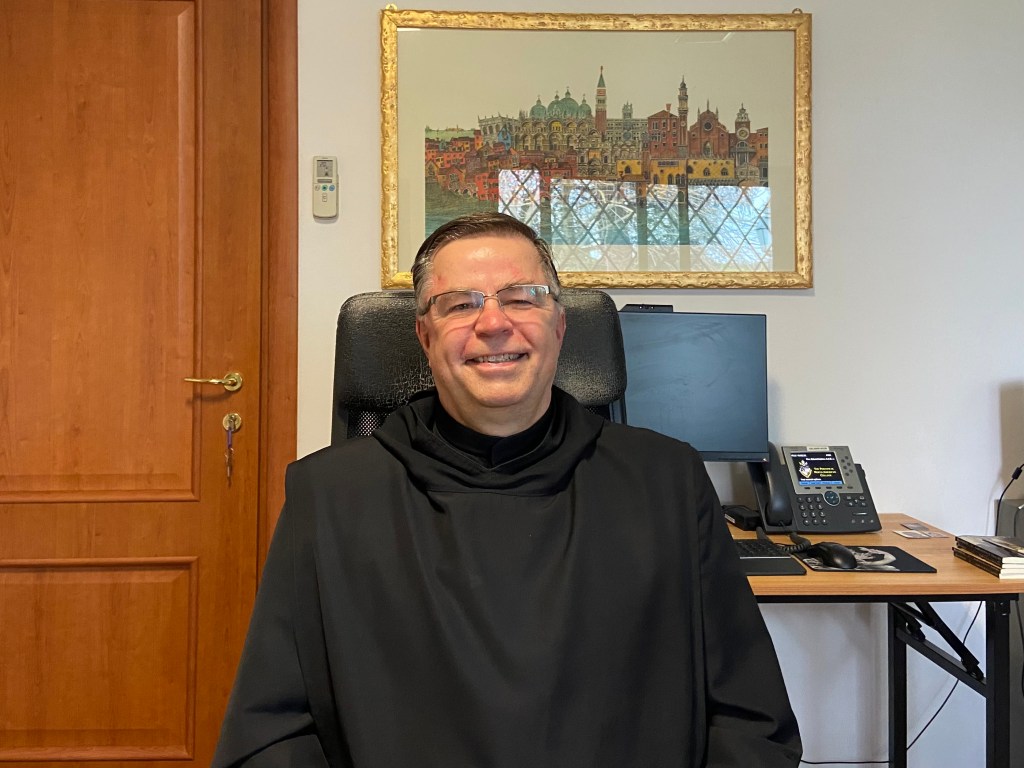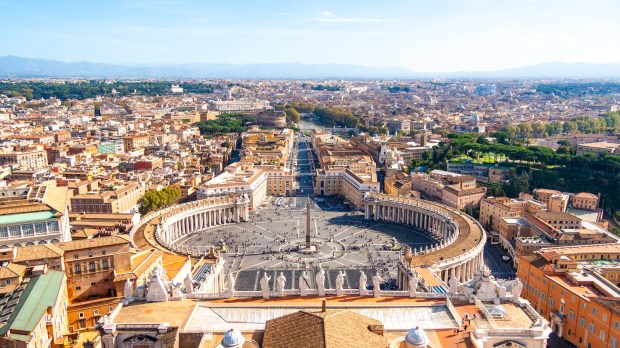“Forming priests means serving them, […] assisting them in discernment, accompanying them in their difficulties, and supporting them amid pastoral challenges.” This is how Pope Francis described the importance of offering ongoing formation for priests, in a speech to participants of a conference on this same topic on February 8, 2024.
Recent surveysindicate that burnout has become an increasing concern for clergy, so ongoing formation and spiritual renewal has become even more important.

The Institute of Continuing Theological Education (ICTE), within the North American Pontifical College (NAC) in Rome, has been trying to assist priests in their formation by offering different types of sabbatical programs throughout the year. They offer two types of educational programs in the Spring and Fall to help priests with their ongoing formation.
[See the video at the end of the interview.]
Aleteia spoke to Father Edward Linton, a Benedictine monk originally from the US and the Director of the ICTE, about the value of offering ongoing formation programs for priests and the importance of staying curious and intellectually stimulated.
Who usually participates in the programs you offer?
Father Edward Linton: The typical participant has been a priest for around 20 to 25 years or more, and is usually involved in parish ministry. They also tend to be diocesan priests from the US or other English-speaking countries such as Canada, Australia, or New Zealand.
However, there is still some diversity because several priests, although they may be serving in the US, are originally from another place such as South America, Africa, or Asia.
Why do you think it is important for priests to take sabbatical leave and participate in programs such as the ones the ICTE offers?
Father Edward Linton: Firstly, why would we think that a priest would be fully formed after a relatively small number of years in his life? Even if he was in the seminary for as many as 12 years, his formation as a priest is not complete when he is ordained, so one important reason is to help the priests realize that. It is important for them to continue their formation intellectually, spiritually, and emotionally.
The second reason is to sustain priests in their ministry. In many places priests are finding that they have less and less free time. Many times priests come here and they are exhausted from the amount of work they have to do. It is important for a priest not to get burned out, not to allow the expectations of his ministry to overwhelm his formation.
The third reason is that curiosity is very important, especially in the life of a priest who is asked to preach Sunday after Sunday, or day after day. A program like this sparks a person’s curiosity; it helps keep their mind fertile. This can then enhance the life of the parish, not only in the priest’s preaching but also in his outlook.
The fourth reason is because of priestly fraternity. Many priests, because of their living situation, could go for a very long time without seeing another priest. By having this fraternity here they can be formed by one another in their ministry. They can talk about things only priests can talk about.
In recent years, surveys have shown that many priests across the world are suffering from burnout. Do you think participating in programs like this can help?
Father Edward Linton: I do see priests who arrive here very often exhausted. One antidote to the burnout is helping people immerse themselves in curiosity through the classes that we offer but also through the tours we take. We are in Rome and are surrounded by so many fascinating things: churches, landmarks, the atmosphere.
The aspect of priestly fraternity is also equally important. Some can arrive here perhaps even feeling discouraged about their lives as priests. Being around other priests who are feeling happy in their priesthood can help them come back to life. That is the most heartening thing about my job, seeing priests falling in love with their priesthood again.
Also on a smaller level, being on a seminary campus [as the NAC hosts seminarians from the US, editor’s note] helps. The priests see the seminarians who are excited and enthusiastic just like they were. Being around young people who are fresh and idealistic can’t help but reinvigorate.
How do you think priests can help themselves avoid burning out before arriving at a program like this one?
Father Edward Linton: A priest shouldn’t do a sabbatical, be refreshed, and then think, “I am going back to living life the way I did, holding my breath for however many years until I can take another sabbatical.” I prefer not to call this a sabbatical program but a continuing formation program because of this concern.
There are other ways also priests can continue their formation: Many dioceses offer ongoing programs, such as workshops. Priests are also expected to take an annual retreat, which can help them stay fresh and inspired.
I think there are also things that a priest can do with resources available online. It does not necessarily have to be theological. If a priest has an interest in something and in his free time wants to investigate it to keep his mind involved intellectually, this is very important.
Does the program offer specific courses or activities to help with burnout?
Father Edward Linton: Not specifically, but we do have courses that could be helpful. For example, we have a course on communication in difficult situations, as communicating in a toxic environment can lead to priests feeling frustrated or burnt out or generate trauma. We have a professional that comes to talk about this.
In a recent speech to the participants of a conference on priestly formation, Pope Francis encouraged them to revive the “zeal for the apostolic ministry” and highlighted the importance of ongoing formation throughout one’s priestly life. What do you think about the Pontiff’s view? Do his words encourage you in your mission here?
Father Edward Linton: Absolutely. What we are seeing is the evolution of an idea that came out of the Second Vatican Council, from the document Optatam Totius [the Decree on Priestly Training published in 1965, editor’s note]. It is an idea that the Church has taken and worked with over the years and now you see it at its pinnacle with what Pope Francis is saying about ongoing formation. Even a priest who has been ordained for 50 years can continue learning.
Whatever work we are doing, it is too easy to get involved in the daily putting out of fires, in the daily challenges. This is the same thing with a priest: he has all sorts of urgent pressures on his time. It is not often he can take a step back and think about his vision for his priesthood and ministry, so hearing the Pope talk in this way is very hopeful.
What do you think the priests that participate in this program take back with them when they return to their dioceses?
Father Edward Linton: Every person that comes here takes something different home. One thing I believe is common is they return with a larger context of their ministry and a more international view of the Church, as they meet priests from all over the English-speaking world.
They also take back the conversations that occur here, such as the discussions that may come out of looking at a renaissance painting. Those conversations will continue to form them and the way they think of things and the way they preach. They take home with them a new curiosity.
I hope they also take home the understanding that ongoing formation is something they have to take seriously in their daily lives. Being here is a unique experience but that doesn’t mean they don’t need to take responsibility for their curiosity, their spirituality, their ministry and life as a priest when they return.
How can priests attend a program at the ICTE? What is the cost for a priest attending and how can it be paid for?
Father Edward Linton: Different dioceses have different policies on if and when a priest can do a sabbatical. Some have a generous program that every 7 or 10 years a priest can apply to go, while others may not have any policy or procedure at all.
The cost for the Spring program is $16,500 and the first and third module of the Fall program is $7,400 and the second module is $5,200. The cost is all-inclusive. There are various ways that priests can pay for it. Some dioceses have funds available for priests to do continuing formation, sometimes the diocese will pay part of it and the priest and/or the parish will pay the rest. Other times priests may pay for it all by themselves, if for example they have received cash gifts after an anniversary.
In the United States there are also scholarships priests can apply for. For example the Lilly Foundation has a grant that priests can apply for. It is focused on priests and the parish because they understand that sending their pastors away for a sabbatical can enhance and renew the life of the parish.
Join us at ICTE! from edward linton on Vimeo.

